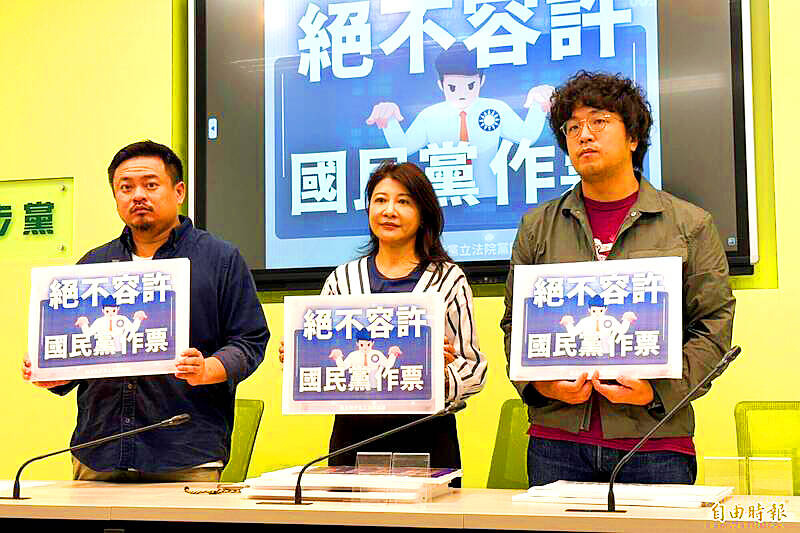The Chinese Nationalist Party (KMT) “rigged” a vote on whether to review its proposed pension reform by allegedly having someone impersonate an absent lawmaker, the Democratic Progressive Party (DPP) caucus said yesterday.
The DPP said that the session records showed KMT Legislator Sasuyu Ruljuwan (盧縣一) had not signed in, but participated during the first vote — on the pension reform plan — while abstaining from the second and third votes.
Ruljuwan confirmed he was in China, saying that he was representing indigenous Taiwanese and visiting one of China’s ethnic minorities.

Photo: Chen Cheng-yu, Taipei Times
The DPP caucus yesterday held a news conference calling for the KMT caucus to respond to the matter.
The act fits the definition of forging a signature and contravenes the Criminal Code, the DPP said.
Staff from the Legislative Yuan’s Conference Department only distribute ballots to legislators after ascertaining that they have signed in and are present, DPP Legislator Michelle Lin (林楚茵) said.
The DPP caucus would file a formal complaint with Legislative Speaker Han Kuo-yu (韓國瑜) and request an investigation, DPP Legislator Hung Sun-han (洪申翰) said.
The KMT caucus said the Conference Department was responsible for clarifying the issue, and that the matter should be handled according to the legislature’s regulations.
No one can force the staff to hand out another lawmaker’s ballot, so only they could answer why Ruljuwan was given a ballot when he was in China, KMT Legislator Wang Hung-wei (王鴻薇) said.
The DPP’s request for a thorough review would not harm the KMT; it would only cause the Conference Department to suffer, Wang added.
The department staff might have mistaken KMT Legislator Ting Hsueh-chung (丁學中), who wore a mask, for Ruljuwan, KMT Legislator Hsu Chiao-hsin (徐巧芯) said, adding that if that were true, it was an oversight of legislative procedure.
Without counting Ruljuwan’s vote, the voting would have ended in a 47-47 tie, Hsu said.
This would not have changed the result, as Han would have cast his vote in the event of a tie, and the result would have been 48 against and 47 in favor, Hsu added.
Taiwan People’s Party legislators abstained from both rounds of voting.

Beijing could eventually see a full amphibious invasion of Taiwan as the only "prudent" way to bring about unification, the US Department of Defense said in a newly released annual report to Congress. The Pentagon's "Annual Report to Congress: Military and Security Developments Involving the People's Republic of China 2025," was in many ways similar to last year’s report but reorganized the analysis of the options China has to take over Taiwan. Generally, according to the report, Chinese leaders view the People's Liberation Army's (PLA) capabilities for a Taiwan campaign as improving, but they remain uncertain about its readiness to successfully seize

Taiwan is getting a day off on Christmas for the first time in 25 years. The change comes after opposition parties passed a law earlier this year to add or restore five public holidays, including Constitution Day, which falls on today, Dec. 25. The day marks the 1947 adoption of the constitution of the Republic of China, as the government in Taipei is formally known. Back then the Chinese Nationalist Party (KMT) governed China from Nanjing. When the KMT, now an opposition party in Taiwan, passed the legislation on holidays, it said that they would help “commemorate the history of national development.” That

Taiwan has overtaken South Korea this year in per capita income for the first time in 23 years, IMF data showed. Per capita income is a nation’s GDP divided by the total population, used to compare average wealth levels across countries. Taiwan also beat Japan this year on per capita income, after surpassing it for the first time last year, US magazine Newsweek reported yesterday. Across Asia, Taiwan ranked fourth for per capita income at US$37,827 this year due to sustained economic growth, the report said. In the top three spots were Singapore, Macau and Hong Kong, it said. South

Snow fell on Yushan (Jade Mountain, 玉山) yesterday morning as a continental cold air mass sent temperatures below freezing on Taiwan’s tallest peak, the Central Weather Administration (CWA) said. Snowflakes were seen on Yushan’s north peak from 6:28am to 6:38am, but they did not fully cover the ground and no accumulation was recorded, the CWA said. As of 7:42am, the lowest temperature recorded across Taiwan was minus-5.5°C at Yushan’s Fengkou observatory and minus-4.7°C at the Yushan observatory, CWA data showed. On Hehuanshan (合歡山) in Nantou County, a low of 1.3°C was recorded at 6:39pm, when ice pellets fell at Songsyue Lodge (松雪樓), a